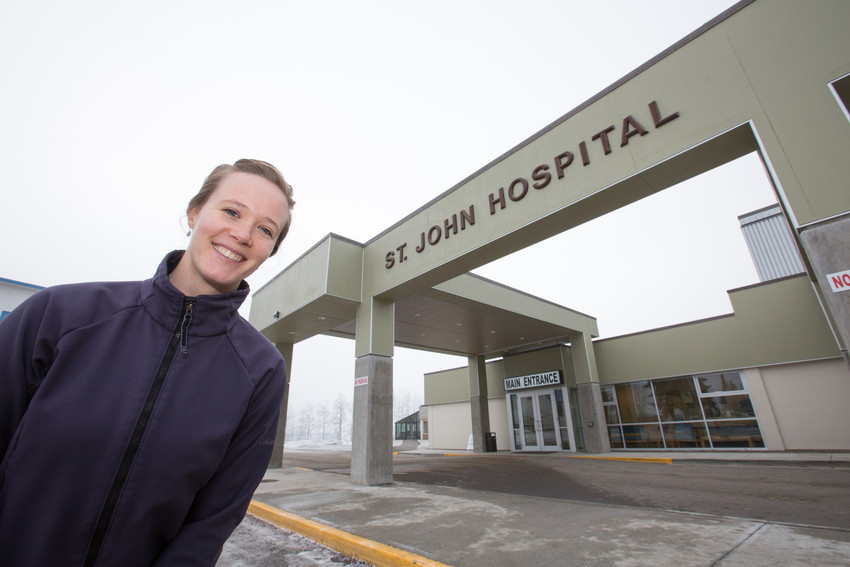Vanderhoof’s six-year shortage of physiotherapy services has been alleviated thanks to a graduate from the first Northern and Rural Cohort of UBC’s physical therapy program.
Kaley Hopps, who earned her Master’s of Physical Therapy (MPT) degree in November, started her role with St. John Hospital and Stuart Nechako Manor in late 2014.
“The recruitment of Kaley Hopps is great news for Vanderhoof and area residents,” said Nechako Lakes MLA John Rustad. “Physiotherapist positions have been difficult to recruit in many rural areas across the province, including the North. Kaley’s arrival provides increased and more accessible services for our region’s patients.”
The Northern and Rural Cohort (NRC) was designed to encourage aspiring physiotherapists to consider working and living in northern and rural B.C. As part of their training, students in the NRC receive several weeks of instruction at the Physiotherapy Plinth Lab at the University of Northern British Columbia (UNBC) campus in Prince George, sharing lectures and practical labs with Vancouver-based students through video-conferencing. They also receive most of their clinical training in northern and rural communities across the province.
Hopps was one of 16 students in the first cohort. She grew up in Port Alberni on Vancouver Island and attended the University of Alaska in Anchorage, where she earned a Bachelor of Science in Physical Education. After working in various community-oriented roles, she decided, in 2012, to fulfill her long-time dream of becoming a physiotherapist.
Physiotherapists are health professionals who combine knowledge of how the body works with specialized hands-on clinical skills to restore, maintain and maximize a patient’s strength, function and movement. They help people recover mobility after injury, surgery or stroke; enable elderly people to maintain their independence; and assist those with chronic conditions, such as cancer or multiple sclerosis, to improve fitness and quality of life.
“I had my mind set on working in a smaller community setting and have been really enjoying my time here so far. The support from my co-workers has been great,” Hopps said. “My husband Jesse and I have met so many wonderful people and we’ve already started volunteering for various local organizations. It’s a whole new area to explore for us, which was a big draw for me.”
Hopps fills a position that has been vacant since 2008, when the previous physiotherapist left. A private practice physiotherapist from Vanderhoof had been providing interim assistance at Stuart Nechako Manor.
Northern Health continues to work with partners, including UBC and UNBC, to find innovative approaches to recruiting and retaining physiotherapists in northern B.C. Within the Northern and Rural Cohort program is the Prince Rupert Inter-professional Student-led Model (PRISM) Clinic that allows physical therapy and occupational therapy students to offer rehabilitation services to patients with a large variety of injuries and chronic diseases, under the supervision of experienced professionals. Physiotherapy students also work at the Central Interior Native Health Society in downtown Prince George to provide better access to care for First Nations people.
”We’re pleased to have a graduate of the Northern and Rural Cohort choosing to work for Northern Health,” said Michael McMillan, Northern Health northern interior chief operating officer. “The partnership between Northern Health and post-secondary institutions shows creative, strategic approaches to recruit physiotherapists to northern B.C.”
Funding for the program comes from the Province of British Columbia. UBC’s Northern and Rural Cohort is delivered in partnership with UNBC.
“Kaley’s new role in Vanderhoof is a good example of why the Northern and Rural Cohort was established,” said Robin Roots, the coordinator of clinical education for the Northern and Rural Cohort. “Our main focus is to increase recruitment and retention of physiotherapists in northern and rural communities by providing students with more opportunities to experience clinical placements in these areas.”
Students are selected for the Northern and Rural Cohort from among successful applicants to the two-year Master’s of Physical Therapy Program, which is part of the UBC Faculty of Medicine. Selection is based on their grade point averages, interview scores and their rural background and suitability for rural practice. The first NRC was admitted in September 2012.
